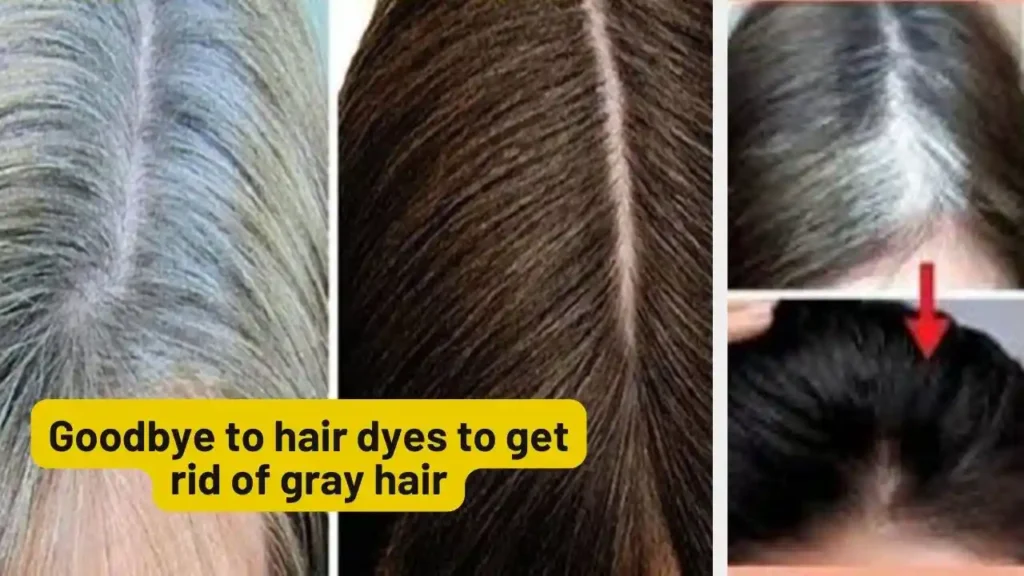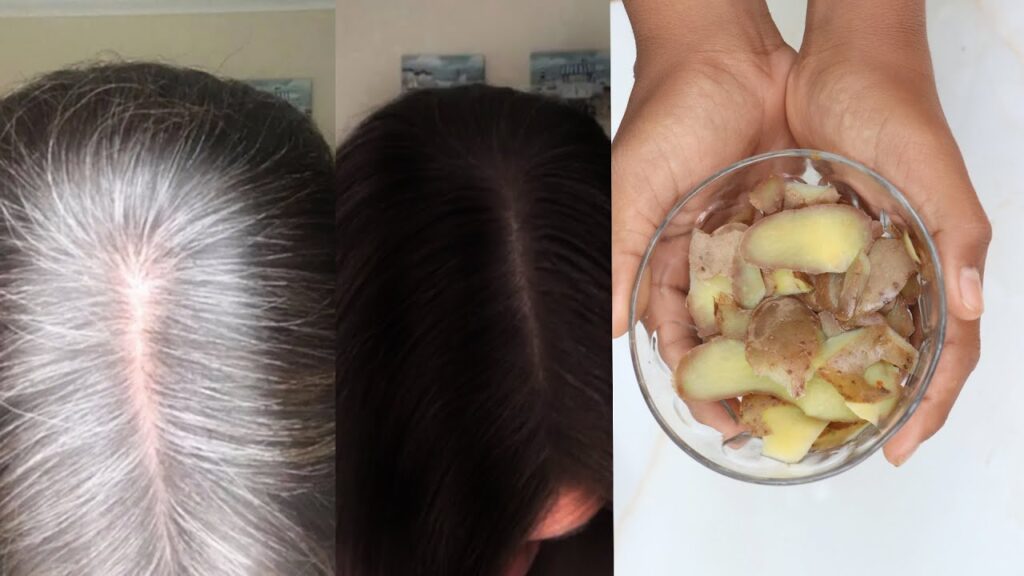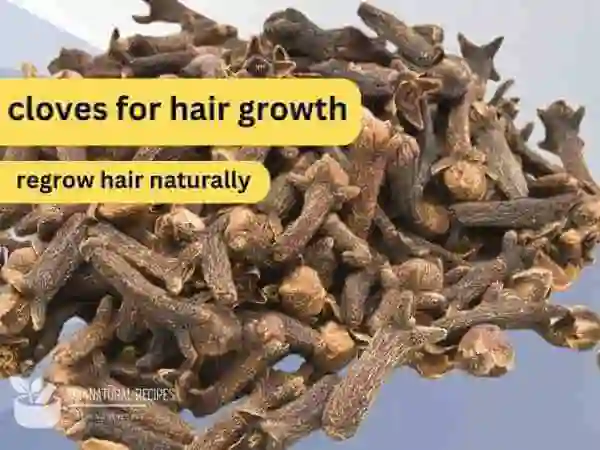Introduction
Gray hair is often seen as a natural part of aging, but it can also appear prematurely due to various factors such as genetics, stress, and lifestyle choices. This has led to a common question: can gray hair turn dark again? In this comprehensive article, we will delve into the science behind gray hair, explore potential natural remedies, and review both anecdotal and scientific evidence on whether it’s possible to reverse graying hair. Additionally, we will discuss other related aspects such as home remedies for grey hair turning into black fast, how to get rid of gray hair permanently, and more.

Understanding Gray Hair
Gray hair occurs when melanocytes, the pigment-producing cells in hair follicles, reduce or cease melanin production. Melanin is responsible for the natural color of hair, skin, and eyes. Several factors contribute to the graying process:
- Genetics: Genetics play a crucial role in determining when and how quickly you go gray. If your parents or grandparents experienced early graying, there’s a good chance you will too.
- Aging: As we age, the production of melanin slows down, leading to gray or white hair.
- Stress: High levels of stress have been linked to premature graying. Chronic stress can affect the health of your hair and scalp.
- Diet and Nutrition: A poor diet lacking essential vitamins and minerals can accelerate the graying process. Nutrients such as B vitamins, iron, and zinc are vital for hair health.
Scientific Perspective
Scientific research on reversing gray hair is ongoing, with some promising findings. The graying process involves oxidative stress, which damages melanocytes. Here are some insights from studies:
- Oxidative Stress: Research has shown that oxidative stress plays a significant role in graying. Antioxidants can help combat this stress, potentially preserving hair color. For example, a study in The FASEB Journal found that the enzyme catalase can break down hydrogen peroxide, a compound that accumulates in hair follicles and bleaches hair from the inside out.
- Stem Cells: Hair follicles contain melanocyte stem cells, which are responsible for producing new melanocytes. Some studies suggest that reactivating these stem cells could restore hair color. However, more research is needed to develop effective treatments.
Natural Remedies and Lifestyle Changes
While scientific solutions are still in development, many natural remedies are believed to help reverse gray hair. These remedies often focus on improving overall hair health and providing the nutrients necessary for melanin production. Here are some popular options:
- Amla (Indian Gooseberry): Rich in antioxidants and vitamin C, amla is often used in hair oils and supplements to promote hair health. It is believed to rejuvenate hair follicles and restore natural color.
- Curry Leaves: Known for their high nutritional value, curry leaves are used in various cultures to maintain hair color. They are believed to strengthen hair and promote pigment production.
- Bhringraj Oil: An Ayurvedic treatment that is said to rejuvenate hair and restore its natural color. Bhringraj oil is often massaged into the scalp to improve circulation and nourish hair follicles.
- Henna: A natural dye that not only covers gray hair but also conditions and strengthens it. Henna is a popular choice for those looking for a natural alternative to chemical dyes.
In addition to these remedies, maintaining a balanced diet rich in vitamins and minerals is crucial. Foods high in B vitamins, iron, and zinc can support hair health and potentially slow down the graying process.
Medical and Cosmetic Treatments
For those seeking more immediate results, medical and cosmetic treatments offer alternatives to natural remedies. These treatments range from supplements to advanced therapies and provide various options for addressing gray hair:
- Supplements: Certain vitamins and minerals, like biotin, folic acid, and B vitamins, are marketed for their potential to improve hair health and color. Some supplements also include herbal extracts believed to support melanin production.
- Medications: Dermatologists may prescribe medications or topical treatments that claim to restore hair pigment. For example, some products contain ingredients that stimulate melanocyte activity.
- Hair Dyes: While not a permanent solution, hair dyes offer a quick way to cover gray hair. There are various types of dyes, including natural and chemical options, that provide different levels of coverage and duration.
- Low-Level Laser Therapy (LLLT): This treatment uses low-level lasers to stimulate hair follicles and promote hair growth. Some studies suggest that LLLT may also affect hair pigmentation, potentially aiding in gray hair reversal.
Success Stories and Anecdotal Evidence
Many people have shared their experiences of reversing gray hair through natural remedies, lifestyle changes, or medical treatments. These success stories often highlight the importance of consistency and patience. While anecdotal evidence can be inspiring, it’s essential to approach it with a critical eye and consider the lack of consistent scientific support.
For example, some individuals have reported that using natural oils like amla or bhringraj regularly helped restore their hair color over several months. Others have found success with dietary changes, incorporating more nutrient-rich foods into their meals. Although these stories provide hope, more research is needed to confirm their effectiveness.
Prevention Tips
Preventing premature graying may be possible through various means. Here are some tips to help maintain your natural hair color for as long as possible:
- Healthy Diet: Ensure your diet is rich in nutrients that support hair health, such as B vitamins, iron, and zinc. Foods like leafy greens, nuts, seeds, and lean proteins are excellent choices.
- Stress Management: Practices such as yoga, meditation, and regular exercise can help reduce stress levels. Managing stress effectively is crucial for overall health, including hair health.
- Avoid Smoking: Smoking has been linked to premature graying and overall hair health deterioration. Quitting smoking can improve your hair’s appearance and health.
- Proper Hair Care: Use gentle hair care products and avoid excessive heat styling. Harsh chemicals and heat can damage hair and accelerate the graying process.
How to Moisturize Gray Hair
Gray hair tends to be drier and more prone to frizz than pigmented hair. Proper moisturizing is essential to keep it healthy and manageable. Here are some tips on how to moisturize gray hair:
- Use Hydrating Shampoos and Conditioners: Look for products specifically formulated for dry or gray hair. These often contain ingredients like argan oil, shea butter, and glycerin to provide extra moisture.
- Deep Conditioning Treatments: Regular deep conditioning treatments can help restore moisture and smoothness. Consider using a deep conditioner once a week.
- Leave-In Conditioners and Oils: Leave-in conditioners and hair oils can provide ongoing moisture throughout the day. Apply a small amount to damp hair and distribute evenly.
- Avoid Heat Styling: Limit the use of heat styling tools like blow dryers, flat irons, and curling irons. When you do use them, apply a heat protectant spray to minimize damage.
How to Get Rid of Gray Hair Permanently
While there is no guaranteed permanent solution for gray hair, some methods claim to offer long-lasting results. Here are a few approaches to consider:
- Laser Therapy: Low-level laser therapy (LLLT) has shown promise in stimulating hair growth and potentially affecting pigmentation. While not a permanent solution, it may provide long-term benefits.
- Hair Transplants: In cases of significant hair loss or graying, hair transplants can be an option. This involves transplanting pigmented hair follicles to areas with gray hair, potentially restoring natural color.
- Gene Therapy: Although still in the experimental stages, gene therapy aims to address the root cause of gray hair by modifying the genes responsible for melanin production. This approach holds potential for a permanent solution in the future.
Conclusion
In conclusion, the question “Can gray hair turn dark again?” remains complex and multifaceted. While there are potential ways to slow down or even reverse the graying process, more scientific research is needed to validate these methods. Natural remedies, lifestyle changes, and certain treatments offer some hope, but results can vary widely from person to person. Ultimately, embracing the natural aging process and maintaining a healthy lifestyle are key to achieving the best results for your hair.
If you’re looking to address premature graying and maintain the health and vibrancy of your hair, consider exploring our range of specialized hair care products. Our collection includes nourishing oils, hydrating shampoos, and restorative conditioners specifically formulated to combat gray hair and promote natural pigment production. We offer products enriched with ingredients like amla, curry leaves, and Bhringraj oil, which are renowned for their ability to rejuvenate hair follicles and restore natural color. Visit our hair care product page to discover the best solutions for your hair care needs and take the first step towards reversing premature graying naturally.


